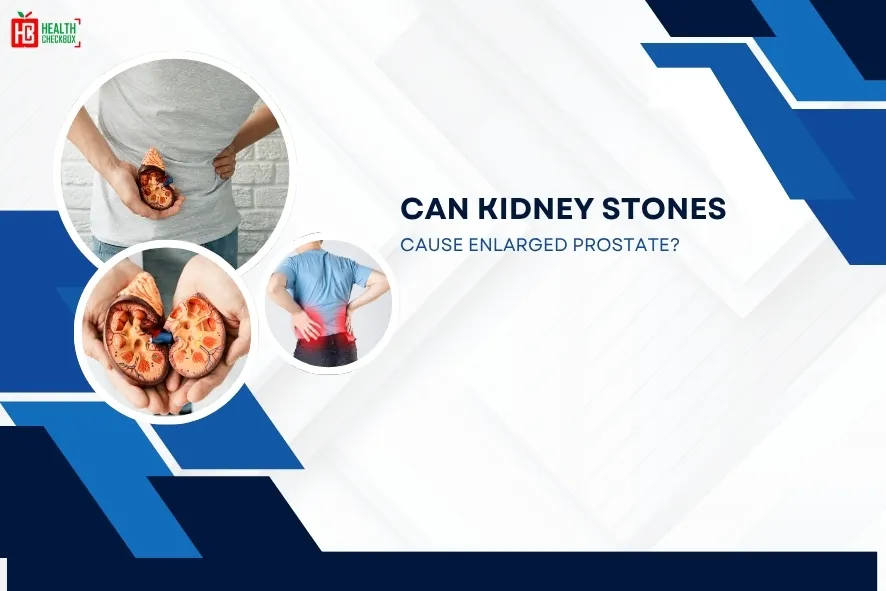We know people suffer from many health conditions, one of them is kidney stones. In India, approximately 13% of the population suffers from kidney stones. It is in the form of shining crystals that are created from minerals and other related substances in your urinary tract. These stones can be as small as a grain or as large as a golf ball. Some small stones may pass out in your pee, but the process of passing out is very painful. The question that arises is whether kidney stones can cause enlarged prostate, so we will cover all the related topics.
Causes of Kidney Stones
Kidney stones are caused by excessive use of crystal-forming substances, which include calcium, uric acid, and oxalate in the urine. These stones are formed due to your body does not have enough liquid to dissolve these substances. Also, here are some common contributing factors that cause kidney stones:
- Intake of Less Fluid: Consume or intake less water in the body can increase the risk of kidney stones.
- High-Sodium Diet: Taking the highest amount of salt in your diet can form stones and increase the risk of kidney stones.
- High-Protein Diet: Food items that include animal protein or meat can increase the risk of kidney stones. You can reduce these risks by taking a proper kidney stone diet chart.
- Genetic Transfers: A family history of kidney stones can be seen in the next generations.
What is an Enlarged Prostate or Benign Prostatic Hyperplasia(BPH)?
An enlarged prostate is mostly shown in older men, these are non-cancerous conditions where the prostate gland is larger in size than normal. This problem can slow down or block your urination and may cause incomplete bladder emptying. Benign prostatic hyperplasia(BPH) or enlarged prostate is not cancerous, but it may point to more serious conditions, which as prostate cancer. Also, these create higher risks of bladder damage, urinary tract infections, and kidney damage.
Connection Between Kidney Stones and Enlarged Prostate
There is a relationship between kidney stones and an enlarged prostate. Enlarged prostate can block the urinary flow from the bladder that leading to urine stagnation. This process increases the risk of stones forming.
Also, these two conditions can show in the same patient, still there is no medical research that can show the correct or accurate evidence that can kidney stones cause enlarged prostate. You only need to understand the real points of how they differ from each other, how they may interact with each other, prevention tips, and medical treatment options.
Do Renal Stones Directly Cause Enlargement Prostate?
No, renal stones do not directly cause enlarged prostate. These are two different conditions that affect or develop in multiple parts of the body. Kidney stones hit the kidney and move to hit the bladder and ureters, while enlarged prostate can increase the size of the prostate gland. Here, we will discuss the points that are the same in both conditions:
- Infections: Both conditions, whether it’s kidney stones and benign prostatic hyperplasia(BPH), can increase the higher chance of urinary tract infections (UTIs).
- Risk Factors: Age, health, diet, and hormonal changes are all risk factors for both kidney stones and enlarged prostate.
- Same Symptoms: Both conditions, whether it’s kidney stones and benign prostatic hyperplasia(BPH), can cause painful symptoms and difficulty in urination.
Symptoms: Kidney Stones vs Enlarged Prostate
The symptoms of both renal stones and enlarged prostate can be the same, but some may differ. We discuss below, you can read them:
Symptoms of Kidney Stones
Here are the symptoms of kidney stones:
- Highly pain
- Stomach upset
- Fever
- Vomiting
- Blood in the urine
Symptoms of Enlarged Prostate
The symptoms of an enlarged prostate are as follows:
- Need to urinate urgently
- You may have difficulty while urinating
- You may feel a weak urine stream
- You may feel an incomplete bladder empty
Proper Diagnostic Options for Kidney Stones
There are multiple diagnostic options for the right treatment of kidney stones. Your healthcare provider or a doctor can guide you to the proper options according to your conditions. Here we will discuss some of the diagnostic tests below:
- Ultrasound: This procedure is a non-invasive, or we can say, a radiation-free procedure that uses sound waves to create images of your kidney. Ultrasound helps to find out the exact size of your kidney stones. Firstly doctor suggests doing an ultrasound before treatment.
- CT Scan: A CT Scan is widely famous for diagnosing the kidney stone because it provides an exact location, size, and shape of the stones, also, it can detect the small parts of stones.
- Blood Tests: This test helps to find the level of minerals in your blood that can push the stone formation.
- X-rays: This test can help in finding the larger stones, but is less effective in finding the small stones.
- Urine Tests: A urine test helps in detecting blood, infection signs, and crystal formation. A 24-hour observation for a urine test can help in detecting the amount of stone-forming minerals.
Conclusion
As we discussed above in the blog, can kidney stones cause enlarged prostate, including the connection between them, the symptoms of both renal stones and enlarged prostate, and the proper diagnostic options for kidney stones. All the problems related to the kidneys come under the urology and nephrology departments. Kidney stones and an enlarged prostate can be cured with proper doctor’s guidance, you only need to follow them.

